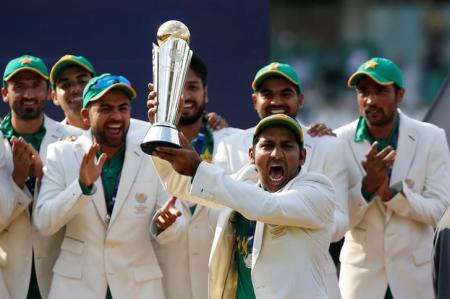
By Jibran Ahmad and Gul Yousafzai
PESHAWAR/QUETTA, Pakistan (Reuters) – Cricket-obsessed Pakistanis flooded onto the streets draped in their national green and white flag in celebration on Sunday after their national team trounced arch-foe India in the Champions Trophy final.
Fireworks and jubilatory volleys of gunfire echoed around major cities as traffic ground to a halt, and young men danced to the beat of drums following their team’s 180-run victory in the match at The Oval in London.
The stunning turnaround in form of Pakistan, which was thrashed by India in their opening game of the tournament and largely written off, has gripped the nation of 190 million people.
“I was not expecting that Pakistan will win the match, it was an unbelievable turnaround,” said stock broker Haris Ali, 55, in the coastal metropolis of Karachi.
TV footage showed some fans watching in Pakistan shedding tears of joy after India’s batting order collapsed.
“I’m so excited Allah has answered our prayers,” said Nek Amal Khan, 42, a street vendor who was amongst thousands to throng the streets of the northwestern city of Peshawar.
Pakistan itself has hosted only a handful of international cricket matches over the past decade due to security fears.
In the western city of Quetta, thousands chanted “Pakistan Zindabad”, meaning “long live Pakistan”, while vendors distributed sweets. “I’m so happy,” said Babar Khan, selling mangoes out of a pushcart.
Indian fans at The Oval ground in London departed early in their droves as the scale of the impending drubbing dawned on them.
In the Indian capital New Delhi, some fans watching an outdoor screening at Connaught Place, a central landmark in the city, chanted nationalist and anti-Pakistan slogans but fell silent as the game neared its climax, before drifting away, dejected.
The cricketing enmity between Pakistan and India has morphed into one of the world’s greatest sporting rivalries. Former Pakistan skipper Waqar Younis once said matches between the two nations were neither sport nor war, but “somewhere in between”.
Outbursts of jingoistic rhetoric and political showdowns between Islamabad and New Delhi have fanned the rivalry over the decades, despite the two nations’ shared cricketing heritage prior to their violent rupture on the creation of Pakistan at the end of British colonial rule in 1947.
“WINNER TAKES KASHMIR”
In Kashmir — a disputed region over which India and Pakistan have fought two of their three wars since independence — the sporting celebrations swiftly sparked violence.
In Srinagar, the summer capital of the Indian Jammu and Kashmir state, residents accused officers of India’s Central Reserve Police Force of smashing cars and beating up people for celebrating Pakistan’s win. Many residents in India’s only majority Muslim state support Pakistan’s cricket team.
One spectator at the Oval in London was spotted wearing a T-shirt saying: “Winner takes Kashmir”.
Over the past decade India has dominated the cricketing rivalry and was the firm favourite going into Sunday’s final, making victory all the sweeter for Pakistanis.
“I would have had no regrets had Pakistan lost to other teams, but it would have hurt me and the entire nation had the Indians defeated us,” said university student Nauman Khan, 28, in Peshawar.
Pakistan’s unlikely victory comes at a time when the sport has been engulfed in crisis at home. The Pakistan Cricket Board is haemorrhaging money and several Pakistani cricketers have been accused of match fixing.
That mattered little, however, on Sunday as Pakistanis savoured the thumping of their much bigger neighbour, whose economic ascendancy and hugely popular Indian Premier League has fuelled fears Pakistan will struggle to hold its own in the future.
“The country needed this victory at a time when everything has been going wrong for so many years,” said Yasser Latif Hamdani, a lawyer who hosted a screening in his home in a well-heeled area of Pakistan’s capital Islamabad.
(Additional reporting by Syed Raza Hassan in KARACHI, Saad Sayeed in ISLAMABAD, Fayaz Bukhari in SRINAGAR, Mubasher Bukhari in Lahore, Saud Mehsud in DERA ISMAIL KHAN and; Doug Busvine and Adnan Abidi in New Delhi; Writing by Drazen Jorgic; Editing by Susan Fenton)